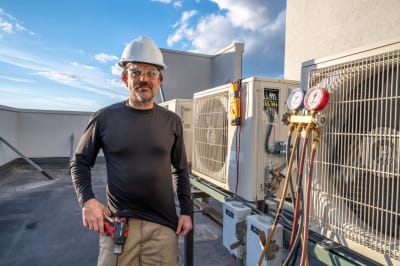For those seeking a career that merges sustainability with hands-on technology, becoming a solar technician in Maine is an increasingly promising path. With the state’s commitment to renewable energy and expanding green infrastructure, there has never been a better time to enter the field.
This guide explains everything you need to know to start and thrive in a solar energy career in Maine.
We’ll explore the fundamental educational requirements, including certificate and associate degree programs available in and around the state. Readers will find detailed insight into classroom-based and hands-on training options, including opportunities supported by Maine’s Clean Energy Partnership and other green workforce initiatives.
How to Become a Solar Technician in Maine
The following are the considerations necessary to become a solar technician in Maine.
Step 1: Earn a High School Diploma or GED
To enter the best programs, anyone looking to become a solar technician in Maine would benefit from a high school diploma or GED. At this level, candidates should focus on math, physics, and basic electrical principles to build a strong technical foundation.
Step 2: Enroll in a Solar or Electrical Training Program
Completing an academic program at a trade school or community college in Maine is an effective way to become a solar technician. Individuals may attend institutions that offer programs in electrical technology, renewable energy, or solar installation.
We explore some of the top programs with relevant coursework in an upcoming section.
Step 3: Get Hands-On Training
Fresh technicians may participate in an internship or apprenticeship with a licensed solar contractor to gain real-world proficiency and confidence in their abilities.
Maine’s solar industry is growing, making hands-on experience critical for learning about site assessments, mounting systems, and wiring. Many apprenticeship programs allow candidates with prior education to begin their training at a more advanced level than those with no prior experience.
Step 4: Certification, Regulations
While not mandatory in Maine, NABCEP certification can significantly boost a solar technician’s job prospects and earning potential. Professionals in the field must also familiarize themselves with Maine’s renewable energy incentives and permitting requirements.
Step 5: Seek Employment or Contract Work
After comprehensive training, fresh solar technicians should start applying for jobs with solar installers, energy contractors, or even utility companies in the state. Candidates might also consider launching a freelance service or starting a small solar business in underserved areas.
Explore trades with similar paths:
Licensure & Certification Requirements
Solar technicians in Maine need a license from the Maine Electricians’ Examining Board before they can start working professionally. Those who don’t have a license must ensure that a licensed electrician supervises them.
Candidates also need a plumbing or mechanical license for solar thermal systems, and a journeyman or master electrician license for solar photovoltaic installations.
Even though it is not compulsory, certification from a prominent professional organization can be valuable for solar technicians in the state. NABCEP (the North American Board of Certified Energy Practitioners) offers the most highly rated credentials in the field.
Top Solar Technician Schools in Maine
Prospective solar technicians in Maine can attend any of the schools below to start their careers on a solid foundation.
Central Maine Community College
Online, ME Online Only
Central Maine Community College is a popular online destination for aspiring solar technicians in Maine. Its curriculum encompasses photovoltaic system design, installation, maintenance, and troubleshooting. Students also learn about safety protocols, electrical principles, and energy efficiency standards.
Tuition
$2,395 per ProgramContact
(855) 520-6806
Maine School Administrative District
Online, ME Online Only
Maine School Administrative District offers a notable online-only solar panel installer training program that emphasizes flexibility and convenience alongside quality.
Tuition
$1,395 per ProgramContact
(855) 520-6806
Northern Maine Community College
Online, ME Online Only
Northern Maine Community College provides a online-only Solar Energy training program for prospective solar technicians in Maine. The program features 40 hours of coursework covering the advantages and disadvantages of solar photovoltaic systems, electricity fundamentals, optimal performance and efficiency, and environmental impacts.
Tuition
$1,195 per ProgramContact
(855) 520-6806
Explore solar technician schools in Maine by city:
Salary & Career Outlook
According to Indeed, at the beginning of their careers, Maine’s solar technicians can earn an annual average salary of $55,041. This typically places them among the bottom 10% of earners, but there is strong potential for upward mobility in the profession.
With time and dedication, those starting at the lower end of the pay scale can move into the median range, earning around $74,188 annually. From there, continued experience and skill development can lead to earnings near $97,766, placing professionals in the top 10%.
Earnings by solar technicians are influenced not just by experience, but also by specialization and location.
Some of the highest-paying cities for solar technicians in Maine currently include Brewer, Augusta, and Portland, with average annual salaries of $79,649, $70,459, and $70,917, respectively.





